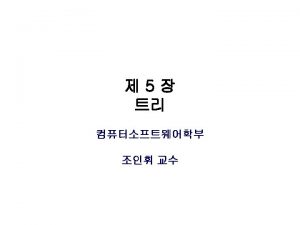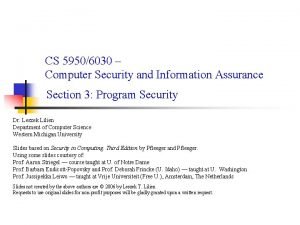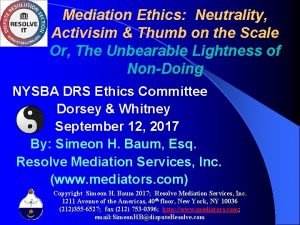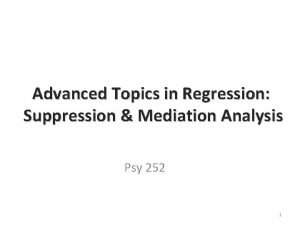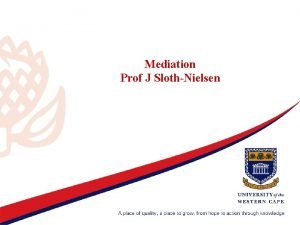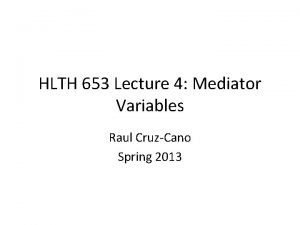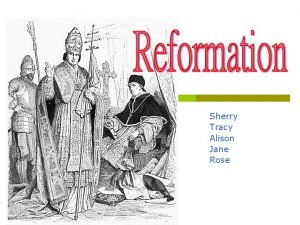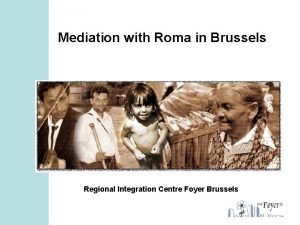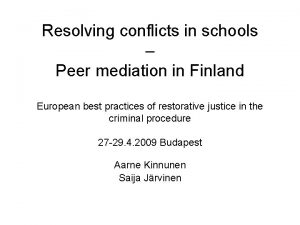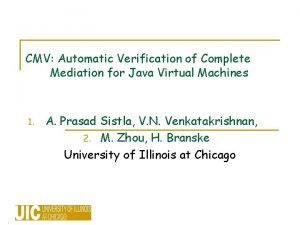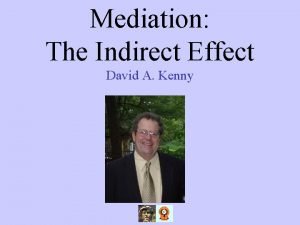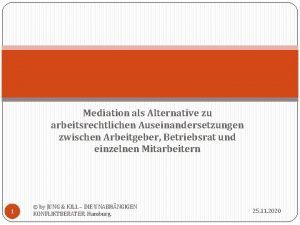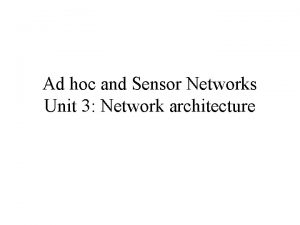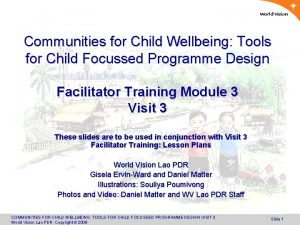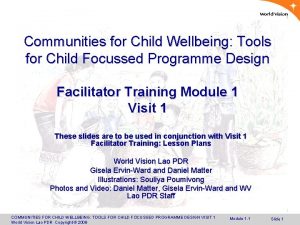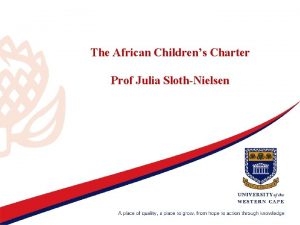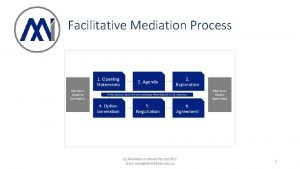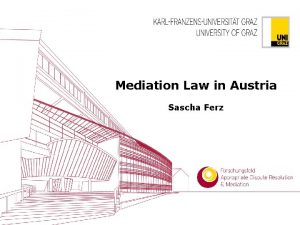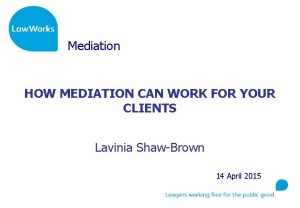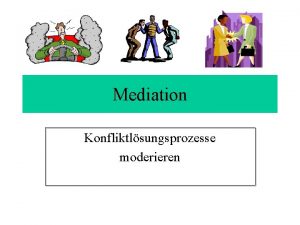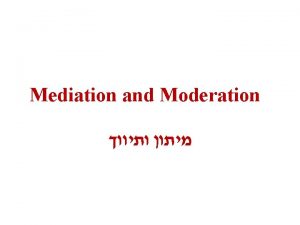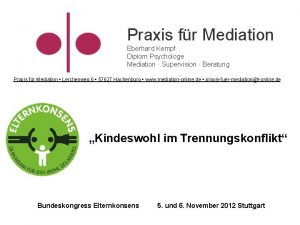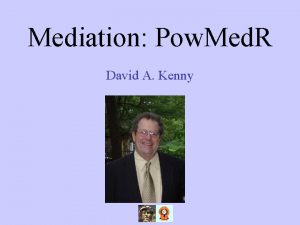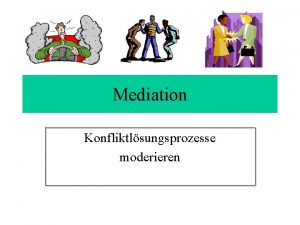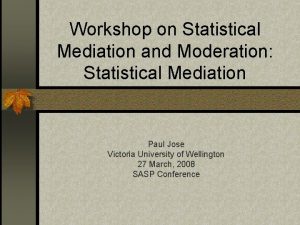Mediation Prof J SlothNielsen Child focussed mediation S
















- Slides: 16

Mediation Prof J Sloth-Nielsen

Child focussed mediation • S 6(4)(a): approach to all matters under the Children’s Act must be conducive to conciliation and problem solving • Not ‘adversarial’ – negative implications for children • Mediator = impartial 3 rd party • Does not have decision making powers (contrast arbitrator, who has decision making powers)

Child focussed mediation • Stages – orientation and introduction (ground rules) • Information analysis/definition of disputed issues • Negotiation stage (generate different options for resolution) • Settlement/agreement stage • Contracting stage – commit to writing

Child focussed mediation • Impartiality of mediator • Parties in control (more likely to stick to terms then) • Multi disciplinary • Private and informal process • Flexible – one or more sessions, mediator can be more or less active • Confidential – statements cannot be later used against parties

Child focussed mediation • Focusses on the future (not the past) • Not for furnishing legal advice (generally) • More conducive to child’s best interests (usually), as avoids adversarial court proceedings • Cases which should not be mediated: • Power imbalance between parties • Child abuse prevailed

Child focussed mediation • • • Parties unwilling to participate Alcohol/drug/mental health problems High conflict Complicated legal issues at stake Family violence present

Mediation in Certain Divorce Matters Act (1987) • Established Office of the Family Advocate • staffed by Family Advocates and social workers (Family counsellors) • Functions proliferated with the Children’ s Act • Must monitor, mediate and evaluate • Provides reports on children’s best interests in all divorce matters/confirmation that best interests served by parties’ agreement • Section 21(3) of the Children’s Act– must mediate if dispute around whether unmarried fathers qualifies

Mediation in Certain Divorce Matters Act (1987) • S 33(2) and 33(5) – if parties experiencing difficulties in exercising parental responsibilities and rights, parenting plan must first be sought with the assistance of family advocate • Registration of parenting plan at office of the family advocate required • Discretionary mediation provisions – s 49, 70 and 71 – lay forum hearings

Children’s Act and mediation • Also pre-hearing conferences (s 69), family group conferences • Inclusion of the child? See s 10 of the Children’s Act, and article 12 of the CRC • But also keep children out of the fray? And parental alienation syndrome – undermining of the relationship with other parent • Benefits – parents get feedback on their behaviour

Current developments in mediation • MB v NB case – cost order against lawyers for not mediating • Parties also adversely judged for wasting 2 days in chambers and 4 days in court • Compulsory in some jurisdictions to mediate (eg Australia) • Accreditation of mediators (Nabfa; • FAMSA and SAMA)

Current development in mediation • Court annexed mediation project ongoing (from December 2014) • Rules drafted for mediators in 2014 (Africa Centre for Dispute Settlement at US) • High conflict post divorce cases – “facilitation” (Western Cape), “case management” (Gauteng), or “parenting coordination”

Parenting coordination • Child-centred process in which a mental health or legal professional with mediation training and experience assists highconflict co-parents in creating or implementing parenting plans, complying with court orders and resolving pre- and post-divorce parenting disputes in an immediate, non-adversarial, courtsanctioned, private forum

Parenting coordination • Power to make binding decisions/issue directives • Become functional link between parents (usually telephone and email rather than face to face) • In some High Courts, PC routinely appointed in divorce proceedings where children are involved to manage aftermath • Advantage – quick decisions • Educates parents to be more functional

Parenting coordination • • Decreases litigation and expenses Improper delegation of judicial authority? Training of mediators? Not standardized High costs of PC Necessity of psychological and legal training Experience should be extensive (eg 18 years) Question as to whether PC should be appointed only with consent of the parties?

Parenting coordination • Question as to what restrictions on PC authority should be provided for – notionally for ‘small’ disputes, not altering the basic court order • Directives/orders can still be reviewed by a court (therefore not the same as arbitration) • TC v SC (Western Cape 2018) • Amendment to Arbitration Act pending to allow arbitration in family law disputes (currently excluded)

SALRC process • Issue paper on family law related matters released for public debate in 2016: compulsory mediation is a strong recommendation • Likely to lead to law reform to provide for this (especially in divorce matters, custody battles)
 승자트리
승자트리 Mediationsgespräch
Mediationsgespräch Incomplete mediation in information security
Incomplete mediation in information security Mediation
Mediation Billing mediation architecture
Billing mediation architecture Mediation hypothesis example
Mediation hypothesis example Mediation in certain divorce matters act
Mediation in certain divorce matters act Mediation
Mediation Moderator vs mediator
Moderator vs mediator Tracy allison mediation
Tracy allison mediation Family mediation brussels
Family mediation brussels Peer mediation meaning
Peer mediation meaning Complete mediation example
Complete mediation example Imiinter
Imiinter David kenny mediation
David kenny mediation Mediation betriebsrat arbeitgeber
Mediation betriebsrat arbeitgeber Mediation device protocol in wsn
Mediation device protocol in wsn
